Want to know how to get better sleep naturally? We’re breaking down the 5 steps to help your body naturally return to better rest so you can wake up feeling energized and rested.
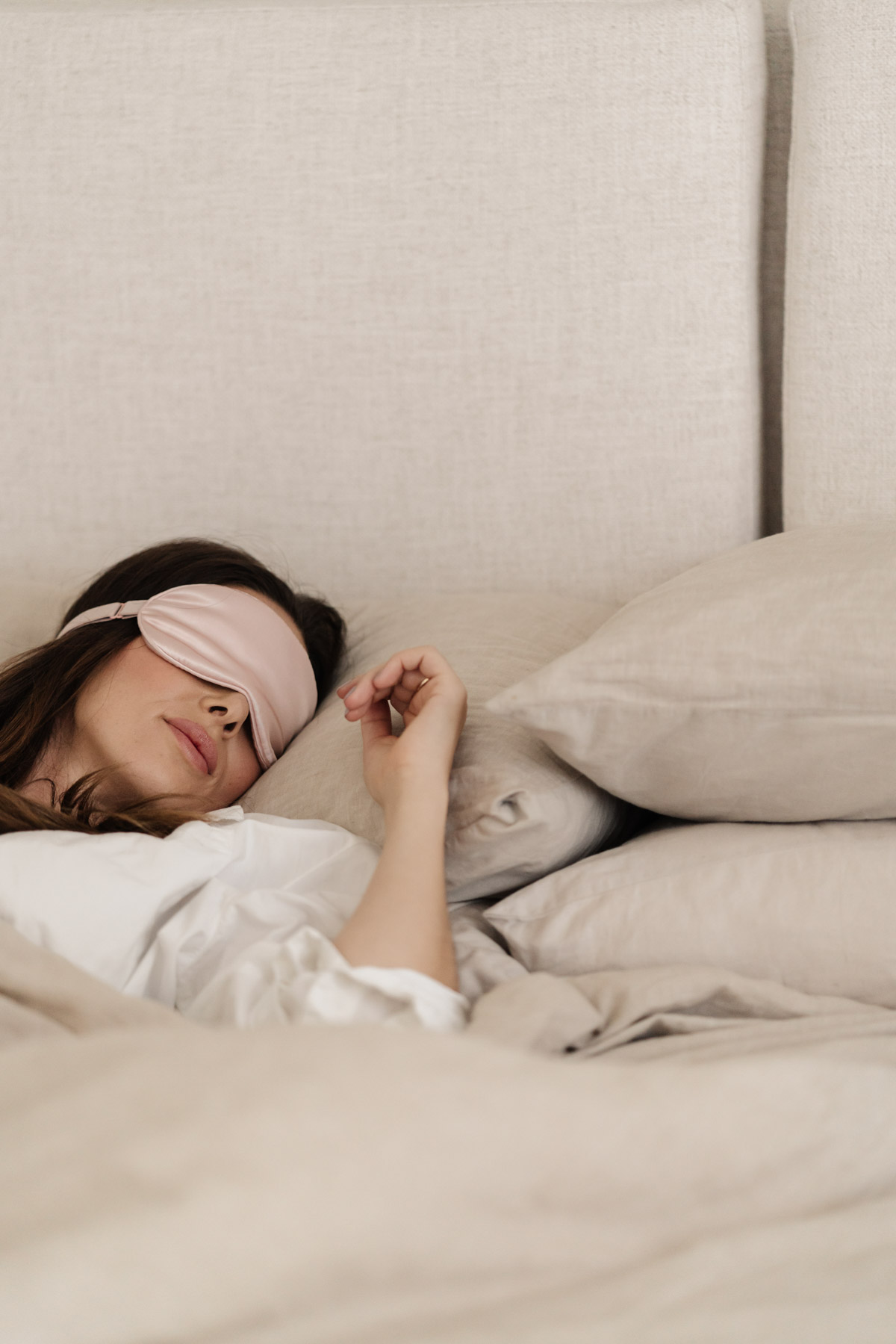
As I’ve gotten older, sleep has become more elusive. With kids, job stress and the pressure to maintain our house—life can be exhausting. And, when you couple that with low-quality sleep you end up with a recipe for a grumpy, tired mom with very little energy for all the things you need to do.
When I’m short on energy, I find myself making rash decisions, getting mad easier, I’m short with my husband or kids and overall just feel down and out.
After a few tough months of sleep, I decided that I needed a major sleep overall. I listened to a sleep masterclass taught by a sleep expert at Miraval Resort in Arizona and it gave me so many tips and ideas of my own to help me get back to sleep naturally.
Now, I regularly get amazing sleep, and when I don’t, I know exactly how to get my body and mind back on track.
I know how precious sleep is to all of us, so if you’re struggling to get good sleep, my hope is that these steps will help you get your own sleep cycle back to a healthy place.
The Incredible Benefits of Good Restful Sleep
We all know that getting a good night’s sleep makes us feel better, but did you know that quality sleep is truly a cornerstone of overall health? There are so many more benefits that extend far beyond simply feeling rested.
Better Thinking & Brain Function
Adequate and restorative sleep is essential for the body’s physical and mental well-being. One of the most apparent advantages of good sleep is improved cognitive function. During sleep, the brain consolidates memories, processes information, and clears out waste products, contributing to enhanced learning, problem-solving skills, and overall mental clarity. You know the feeling of waking up rested and having this alertness about you—it’s life-giving!
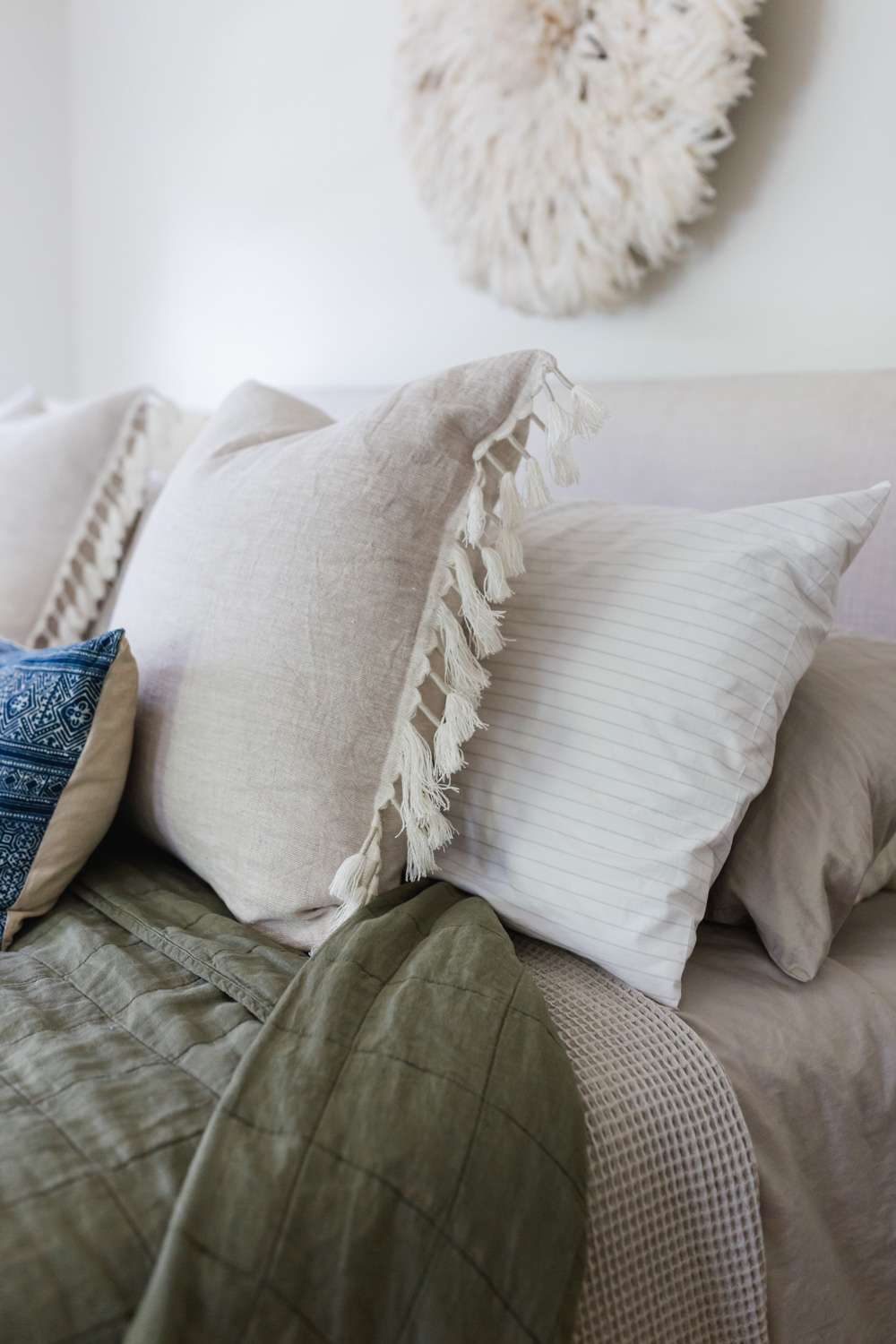
Better Mood & Emotional Well-Being
Better slumber patterns are closely linked to emotional well-being as well. Insufficient sleep has been associated with an increased risk of mood disorders, such as anxiety and depression. On the contrary, a consistent and restful sleep routine helps regulate emotions, reduce stress, and promote a positive mental state. Just think about how much better you handle big and small situations when you’re rested.
Better Immune Function
From a physical standpoint, the benefits of quality sleep extend to immune function and overall resilience against illnesses. Sleep is a crucial time for the body to repair and regenerate tissues, release growth hormones, and strengthen the immune system. Individuals who consistently get enough sleep are generally more resilient to infections and experience faster recovery from illnesses.
Healthy Body Weight
Moreover, sleep plays a pivotal role in maintaining a healthy weight. Poor sleep has been linked to an imbalance in hormones that regulate appetite, leading to increased cravings for unhealthy foods and a higher risk of obesity. I know there’s been days when I’m so tired and I continually reach for chips and sugar to give myself a quick boost. By contrast, those who prioritize quality sleep are more likely to maintain a healthier weight and support their overall metabolic health.
Basically sleep effects everything we do and how we feel! Establishing healthy sleep habits is a fundamental component of a holistic approach to self-care and can significantly contribute to your overall health and quality of life.
So, let’s dive into my 5 steps for getting better rest on a regular basis.
5 Steps: How to Get Better Sleep & Wake Up Feeling Rested
Even if you’re currenly having issues sleeping, our bodies are capable of resetting and healing themselves when provided with the right environment and habits. In these 5 steps we’ll discover the essential ways to get your body back to a place of restful, deep sleep.
Be patient with yourself as regulating your body’s sleep system does not happen overnight. Even when you get back into a good rhythm, you may occasionally have a rough night of sleep. Things like illness or stress can play a huge part in how rested we feel each day. With consistent practice, you’ll be getting more good sleep soon!
Step 1: Create a Sleep Sanctuary
Clean your Room
Remove the visual and mental clutter. Make sure everything has a place. Clear your side table of excess junk, papers, and knick-knacks. I have space for books, a dish to hold chapstick, a lamp and my water bottle.
Put clothes away, clear stuff from your floors and countertops. Visual clutter causes mental clutter. This is true in your bedroom and in the rest of your house. If you’re ever feeling overwhelmed for no particular reason, try purging your spaces. It works wonders.
Ideally, your bedroom is for sleeping—not working!
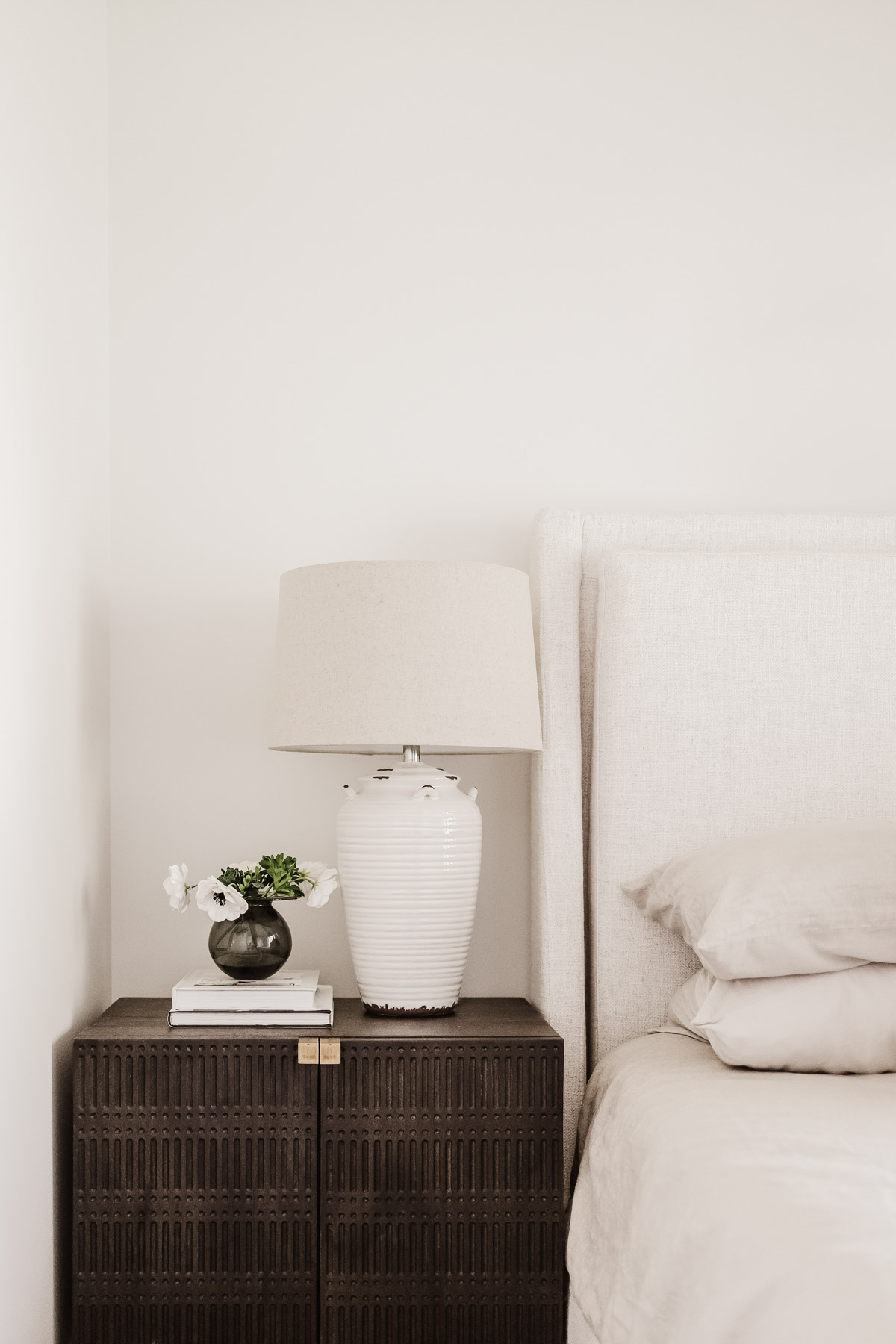
Darken Windows & Remove Excess Lights
We sleep best in dark environments, so make sure that you have room-darkening or black out curtains to keep outside light out. If you have a bright alarm clock, turn the brightness down or remove it completely. You wan your room to be as dark as possible to promote good sleep.
If you do need a light on, avoid any bright or blue lights, opt for red as this promotes sleep and doesn’t wake up your brain the way blue light does.
Add a Sound Machine
Having a quiet space is key for deep sleep. As a mom, I tend to wake up with the littlest sounds—just in case its one of my kids wandering around. One thing that has made a huge difference in good sleep for us is a sound machine. We bought the Dohm when our oldest son was born. It drowns out the little noises and helps me drift off to sleep peacefully.
Comfortable Bedding & a Good Mattress
I know it might sound silly, but slipping into bed into buttery soft sheets and a fluffy comforter or quilt just sets the tone. We’ve tried so many sheets over the years, but the Signature Hemmed Sheet Set we have from Boll & Branch is easily our favorite. They are silky soft, lightweight and breathable! We also got their waffle blanket this past year and I literally can’t sleep without it now. It’s the best bed blanket I’ve ever had—it’s large enough that it hangs far over the edges, stretchy, has a little weight to it which makes it extra cozy and is warm enough for winter, but still lightweight enough for summer. It’s a must in my book!
Everyone will have different preferences on their bedding, so pick what works for you.
Lastly, a good mattress is key. This will keep you from getting aches and pains and promoting restful sleep as well. The best way to figure out which one is best for you is to go into a store and lay down on them. I know there are a zillion online companies now, but there’s no substitute for trying them out for yourself. Most people will sleep better on a more firm mattress, but you’ll never know unless you try. Most mattress companies also allow you to sleep on it for 30-days before fully committing so no worries there!
Step 2: Create a Sleep-Promoting Routine
It’s not just as simple as crawling into bed and falling asleep, is it? To help prep your body for sleep, I suggest creating a sleep-promoting routine that starts anywhere from 30 minutes to 1 hour before you plan on turning the lights off. Doing this routine regularly will help your body know it’s time to start winding down and getting sleepy.
You don’t need to do all of these things, but find a good routine that you love and feels good in your body.
Turn off the Tech
I think collectively, this is one we’re not so great at, but will make a huge difference in how you sleep. An hour, or at least 30 minutes before bed, do any last minute things, then plug in your phone to the wall, set an alarm if necessary, turn it on silent and vow not to look at it!
No more last minute emails or scrolling Instagram (guilty!). Even watching a loud or violent TV show too late can throw me off. Again, avoid all tech at least 30 minutes before bed—got it?
Take a Hot Shower or Bath
Taking a hot shower before bed is proven to help you sleep. I also happen to love showers, so this is my nightly self-care and also gets me good and relaxed. If you like baths, go for it!
It doesn’t have to be long, but a quick warm rinse can signal to your body that it’s time to relax. Do this at least 30 minutes before bed so your body temperature has time to come down before falling asleep.
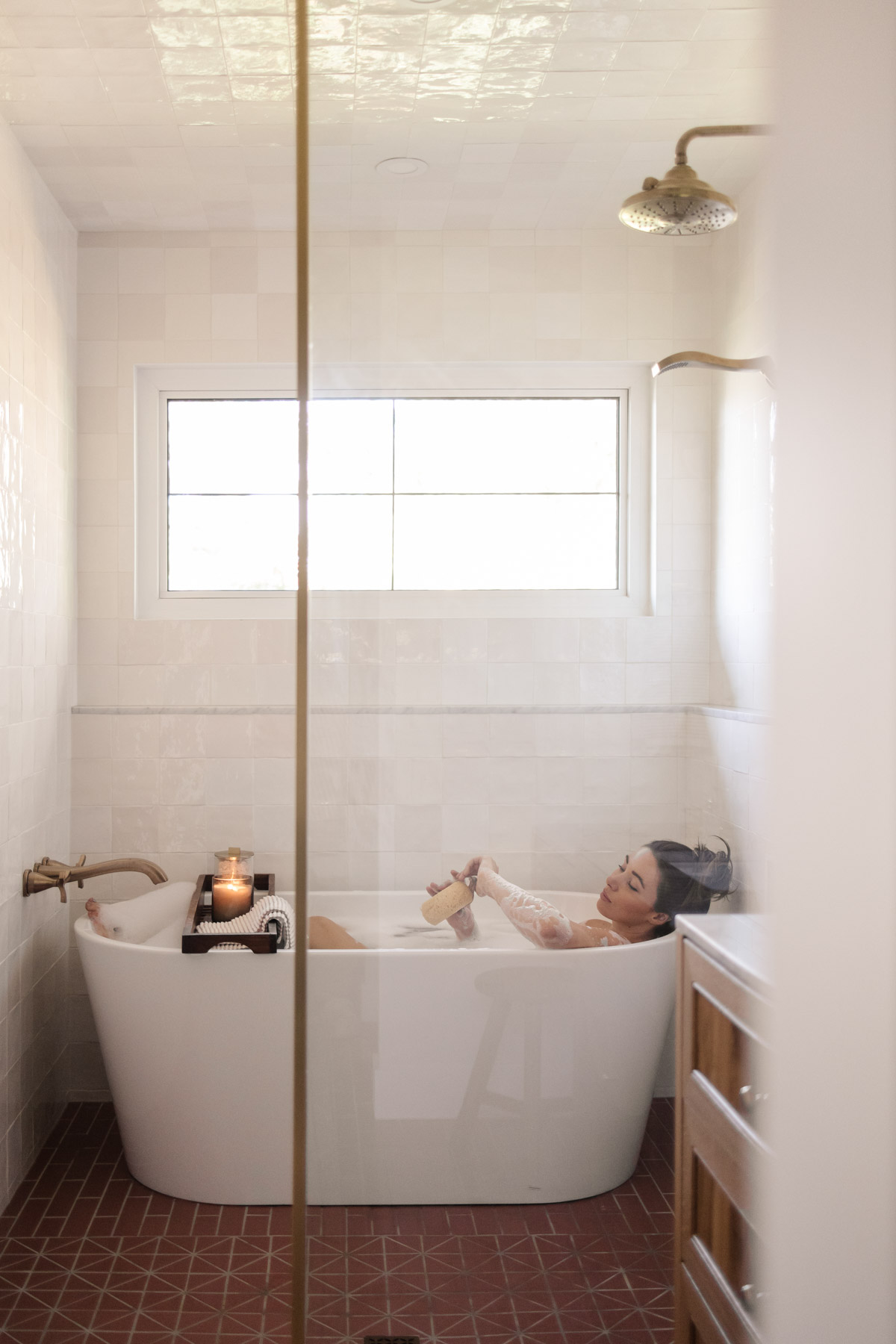
Meditate & Journal
Meditating and journaling can be a great way to clear your mind and get any last minute thoughts out onto paper. Mediation can deeply relax your mind and body which makes it a great pre-bedtime practice. If you’re new to meditating, here are some tips to get you started.
Skincare Routine
A skincare routine is another great way to signal to your brain that the day is done. I personally have a multi-step skincare routine that I love. It’s relaxing and nurturing and a perfect dose of self-care to wrap up the day.
Dim the Lights
Instead of getting ready for bed with all the lights on full bright, dim them, or turn them off and use soft light from lamps. You can easily have a dimmer installed to allow you to dim the lights in your room while going to bed. This is great for your bathroom too since we spend time in there brushing teeth, washing your face and more.
Lower the Temperature
Lastly, before you go to bed, make sure to lower your temperature. Our body temperature dips overnight, so having a room that’s cooler will help you sleep better. The ideal temperature for sleep is around 65-67 degrees.
Step 3: Set Consistent Bedtime & Wake Times
One of the best things you can do to get into a good sleep cycle is going to bed and waking up at the same time everyday. This doesn’t mean you need to turn your lights off at exactly the same time every morning, but generally going to bed at the same time and waking up at the same time will improve your sleep and help set your circadian rhythm.
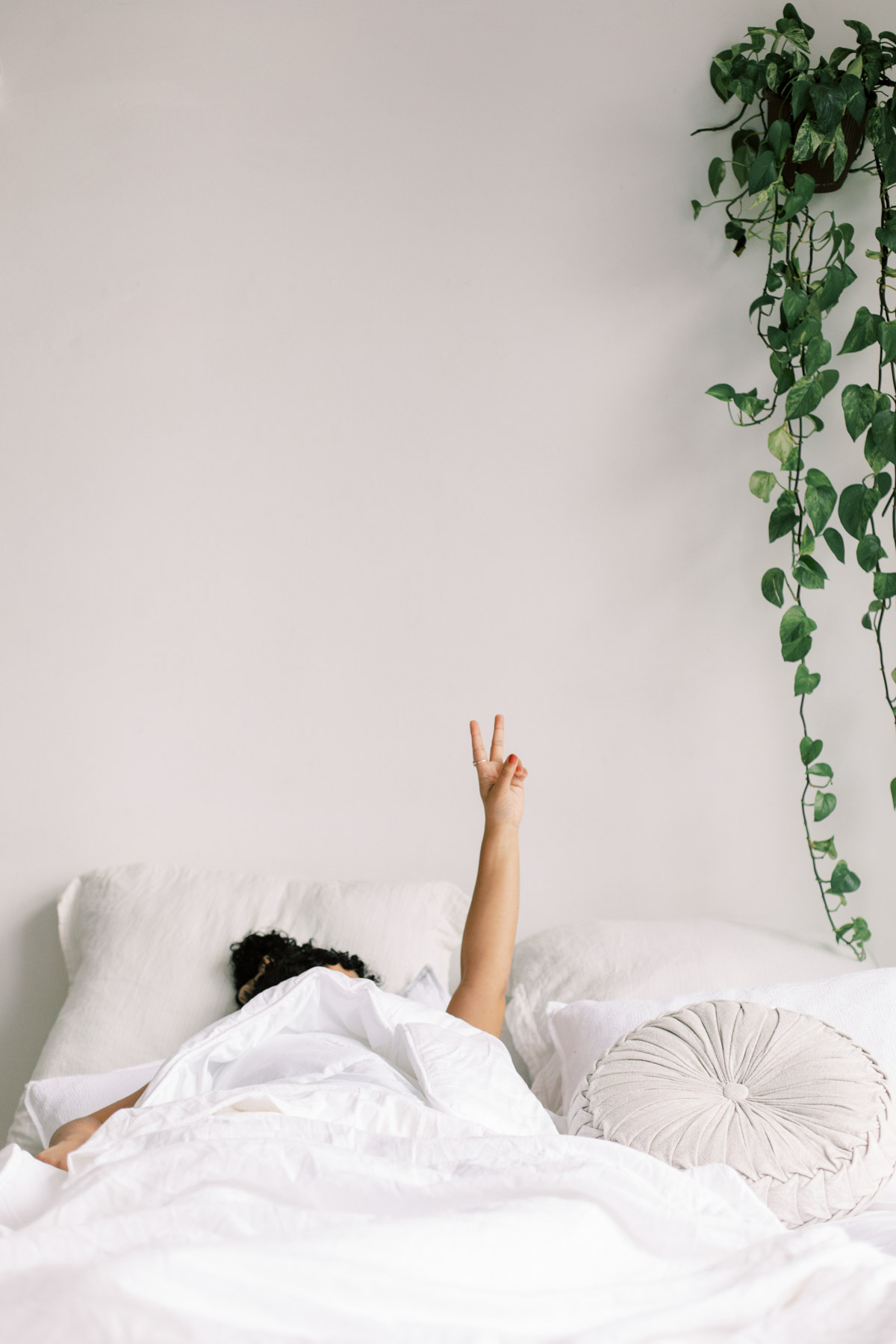
Yes, even on weekends! I know this isn’t always 100% feasible, but when you do it regularly, you’ll find that it’s easier to fall asleep and that your body will start naturally waking itself up. If getting up in the morning is really hard, try moving your bedtime up 30 minutes for a month to see if it improves.
Step 4: Make Healthy Choices

Well-Balanced Diet
Eating a nutritious and well-balanced diet not only promotes overall health but also plays a crucial role in improving sleep quality. Conversely, avoiding stimulants such as caffeine and heavy meals close to bedtime can prevent disruptions to the sleep cycle.
Stay Hydrated
The days where I drink more water throughout the day, I always sleep better. It’s crazy, but I’ve noticed for myself that if I drink around 3 liters throughout the day, I almost always sleep like a rock. The trick is to drink it throughout the day, not a ton right before bed, because that will do the opposite and you’ll be up all night running to the bathroom!
Regular Exercise
Make regular exercise a part of your day or at least 4x a week. Whether it’s weight training, yoga, pilates or running, find something you love and make it happen. Regular exercise can help your body get more restful sleep, and when you get more restful sleep, it’s easier to move your body the next day.

Avoid or Reduce Alcohol
Alcohol is notorious for increasing those middle of the night wakings and keeping our bodies from getting deep, restful sleep. Whenever possible, avoid drinking any alcohol to promote amazing sleep. If you do have a drink, stop at least 2 hours before bed and drink plenty of water.
As I’ve gotten older, I find that alcohol is one of the biggest factors in getting good or bad sleep, so during the week, I do my best to avoid it. If you’re craving something other than water try a seltzer or sparking water, kombucha or even a non-alcoholic drink.
Step 5: Regulate your Circadian Rhythm
Lastly, our circadian rhythm is processes in our bodies that reset every 24 hours—these rely heavily on light and dark and greatly impact your ability to snooze. This is why it’s best to avoid that stimulating blue light late at night. Think of it like the cavemen—in the morning, the sun would come up and signal to the body that it was time to wake up, and as the day goes on, it gets darker, signaling that it’s time for rest.
In our modern age with lights and screens, our circadian rhythms have been knocked off course, but thankfully, we can improve them with a few simple things!
Regular Sunlight
We’ve been taught to avoid the sun in fear of skin cancer, but sunlight is essential to a healthy circadian rhythm. It’s best to be out in the sun within the first 30 minutes of the day. Sunlight also helps with the production of melatonin which helps our bodies drift naturally to sleep.
I mentioned this above, but going to bed and waking up at the same time each day also helps to reset our circadian rhythm.

Avoid Sleep Aids
When you’re not getting enough rest, it can be easy to reach for aids—magnesium, melatonin and even prescription drugs. While these can help in the short-term, a sleep expert I spoke with highly suggested to avoid them, or wean yourself off.
I personally used to take 1mg of melatonin every night, but over time I found it wasn’t helping as much. As our bodies get used to it, we may need to up our dose to get the same effect. Sleep drugs may help you fall asleep, but may not be promoting actual deep, restful sleep. Always talk with your doctor before taking any medication or supplements for sleep support to make sure it’s the best solution for you.
We know that sleep is crucial to our physical and mental well-being and overall health. There are easy ways to reset your cycle naturally so that you can start feeling your best.
Now you know how to get good rest! With regular implementation of these 5 steps, your body will naturally find its way back to sleep so you can wake up feeling rested, energized and ready to take on your day.
BTW, 10 tips for getting better sleep naturally, and why good sheets are totally worth it.


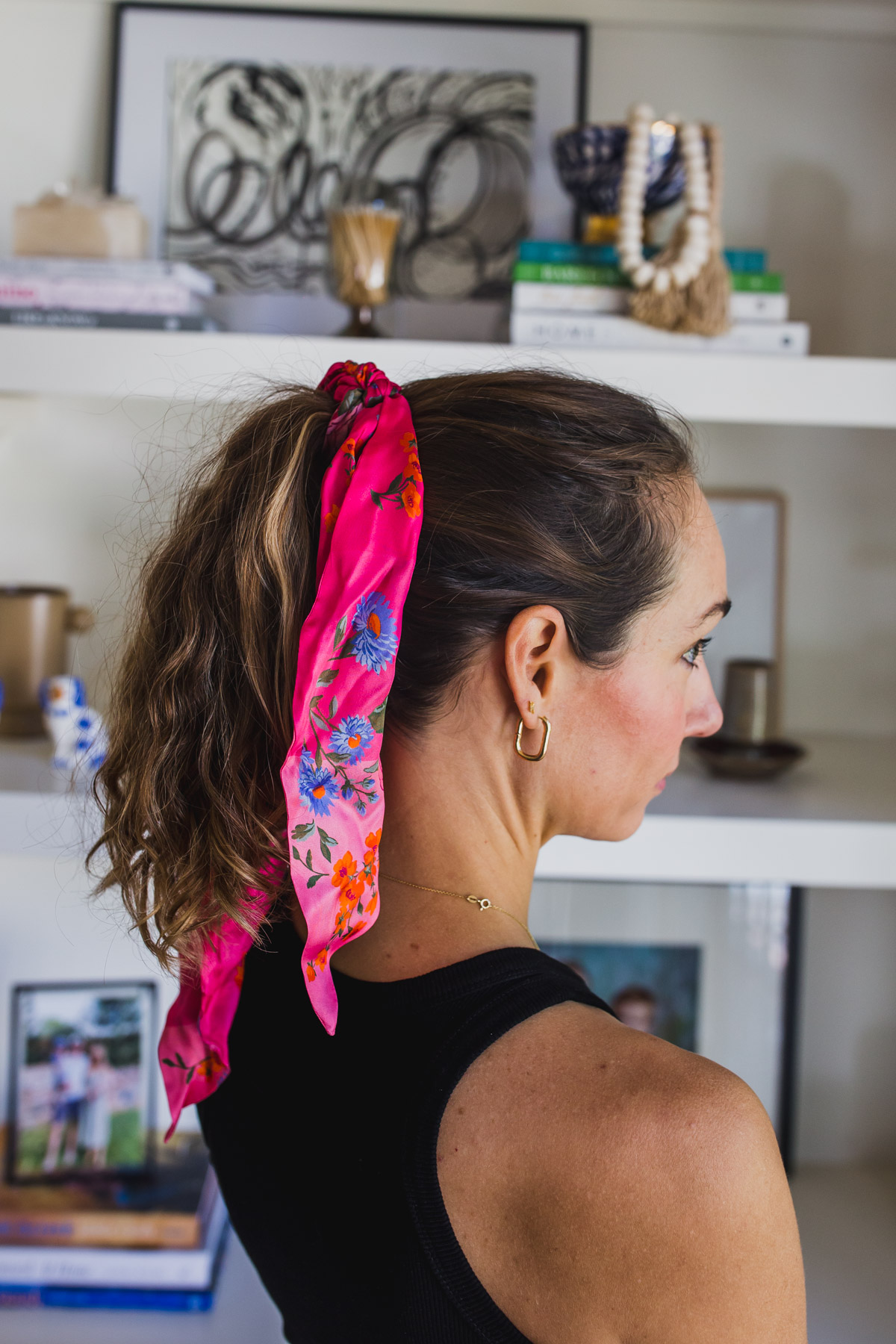






You must be logged in to post a comment.